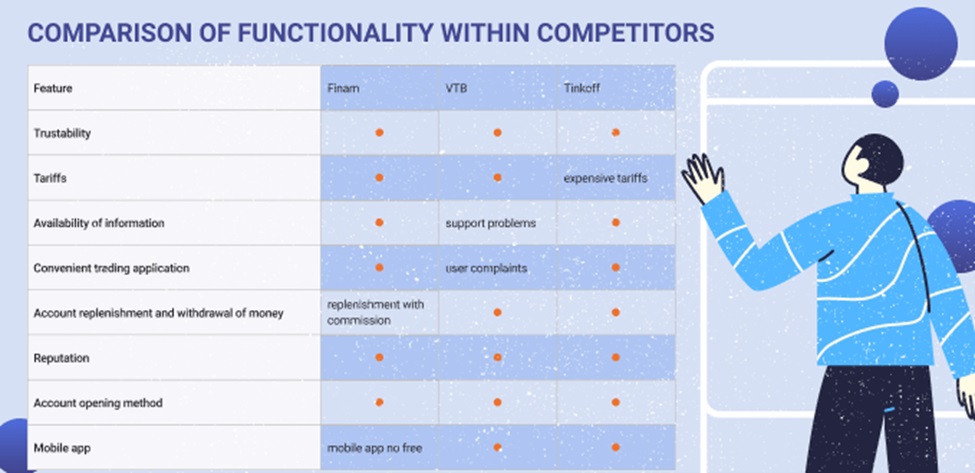Competitive analysis is the process of studying your competition to understand what they are doing well and how you can improve upon it. It is an essential part of any successful UX design process, as it allows you to see what works well for other companies and adapt those ideas for your own projects. In this guide, we will teach you how to do a competitive analysis, what to look for, and how to use the information you gather in your own work.
1. What is competitive analysis for UX design and why do it
Competitive analysis is the process of studying your competition to understand what they are doing well and how you can improve upon it. It is an essential part of any successful UX design process, as it allows you to see what works well for other companies and adapt those ideas for your own projects.

Image Source: adobe.com
As a UX designer, it’s important to understand not only your own product or service but also the competition. By conducting a competitive analysis, you can research what other companies are doing in terms of user experience, and learn from not only their successes but also from their failures. This information can then be used to improve your own design. In addition, a competitive analysis can help you to identify any areas where you have a competitive advantage. By understanding the UX landscape, you can make sure that your product or service is the best it can be.
2. How to do a competitive analysis
In order to do a competitive analysis, you will need to gather data on your competition. This can be done through various means, such as online research, interviews, surveys, and observation. Once you have gathered this data, you will need to analyze it in order to identify patterns and trends.
UX design is all about creating the best possible user experience for your app or website. That means understanding the needs and expectations of your users, and then designing an interface that meets those needs. Part of UX design is competitive analysis, which involves research into how other similar products are designed and used. This can be a valuable exercise, but it can also be time-consuming and expensive, so you may want to consider contracting this work out to a UX design company. UX designers have the skills and experience necessary to quickly and efficiently conduct a competitive analysis, meaning you can focus on other aspects of your product’s development.
But if you are up for it on your own or just want to make sure your UX design team follows through according to best practices, here is a step-by-step guide to conducting a competitive analysis for your app’s UX design:
- Choose your competitor apps. Select 3-5 apps that are similar to yours in terms of functionality and target market.
- Research each app’s UX design. Look at how the app is laid out, what features it offers, and how easy it is to use. Try out each app yourself to get a feel for the user experience.
- Identify areas where your app can improve. Once you’ve looked at all of the competitor apps, identify areas where your app’s UX design can be improved. Maybe there’s a feature that none of the other apps offer, or maybe there’s an area where your app isn’t as intuitive as it could be. Whatever it is, make a note of it so you can address it in your own UX design process.
- Use your competitive analysis to improve your app’s UX design. Once you’ve identified areas where your app’s UX design can be improved, take some time to incorporate those changes into your own UX design process.
Though, UX design is as much about understanding what users might be frustrated with and what can drive them away to make sure your app doesn’t have any of that. If you’re serious about UX design, then you need to be aware of the competition. After all, UX design is a competitive field, and if you want to stay ahead of the curve, you need to know what your rivals are up to. Fortunately, as you have seen outlined here, doing competitive analysis for UX design is relatively straightforward.
3. What to look for when doing a competitive analysis
When conducting a competitive analysis for your app’s UX design, there are 10 key points to consider.
First, you’ll want to take a look at the overall design and user interface of your competitor’s app. Is it easy to navigate? How does it compare to your own app in terms of looks and feel?
Second, you’ll want to consider the app’s user experience. Is it easy to use? Are there any areas where your competitor’s app excels in terms of UX design?
Third, you’ll want to pay attention to the app’s functionality. Does it offer all the features that your own app does?
Fourth, you’ll want to evaluate the app’s content. Is it well-written and informative?
Fifth, you’ll want to consider the app’s price. Is it competitive with your own app’s price?
Sixth, you’ll want to take a look at the app’s rating and reviews. What do users think of the app?
Seventh, you’ll want to evaluate the app’s marketing. How well is the app promoted?
Eighth, you’ll want to consider the App Store Optimization (ASO) of your competitor’s app. How well does it rank in the App Store?
Ninth, you’ll want to take a look at the development team behind your competitor’s app. What are their experience and track record?
Finally, tenth, you should also keep an eye on any new updates or features that your competitor’s app releases.
By considering all of these points, you can get a comprehensive picture of how your UX design stacks up against your competitors.

Image Source: pixetic.com
4. The benefits of doing a competitive analysis
Doing a competitive analysis has several key benefits.
First, it can help you to better understand your industry and the landscape that you operate in. This understanding can be extremely valuable when making strategic decisions about your business.
Second, a competitive analysis can help you to identify opportunities that you may otherwise have missed. By understanding what your competitors are doing well, you can adapt their strategies and make them your own.
Third, a competitive analysis can also help you to avoid making costly mistakes. By understanding what your competitors are doing wrong, you can avoid making the same mistakes and instead focus on what is working well.
5. Conclusion
Conducting a competitive analysis for your app’s UX design is a valuable exercise that can help you to understand your industry, identify opportunities, and avoid costly mistakes. By considering the 10 key points outlined in this article, you can get a comprehensive picture of how your UX design stacks up against your competitors. Doing regular competitive analyses will help you stay ahead of the curve and create an app that users love.

Leave a Reply